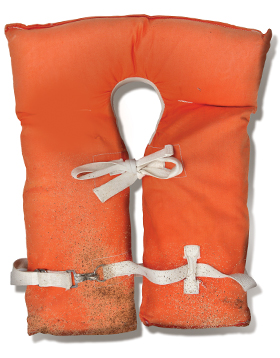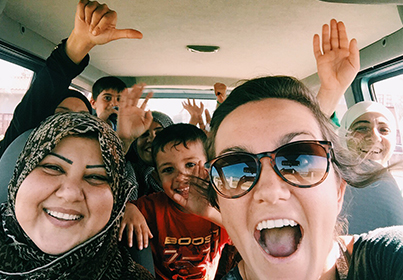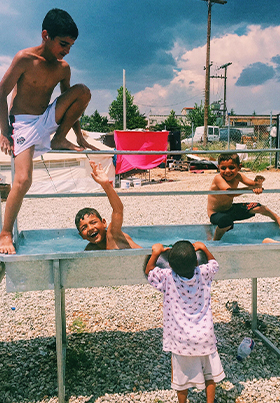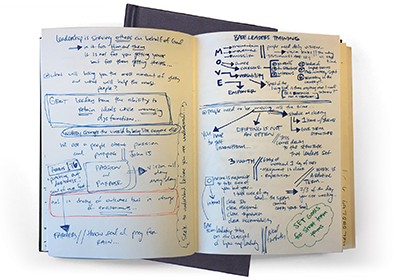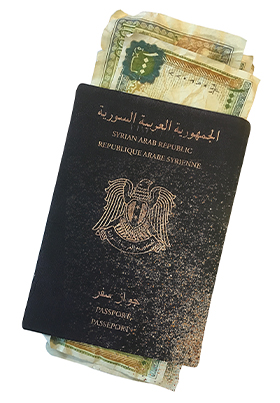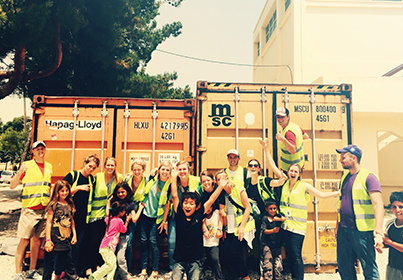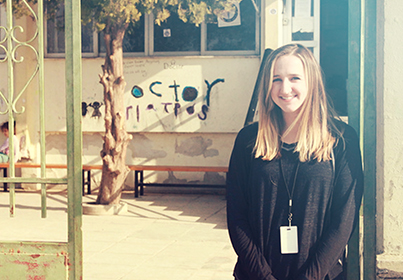Hope & Relief
During summer 2016, Maddie Phenix, BA '12, and hundreds of Baylor students, faculty and alumni were on the front lines of the humanitarian refugee crisis in Greece. Maxey Parrish, senior lecturer in journalism, public relations and new media in Baylor's College of Arts and Sciences, traveled with many of those who answered the call to serve. From what he observed, Parrish believes that there is likely no other group of people associated with one university that has had a greater impact than those from Baylor.
Part 1, Maddie Phenix
Five burly army officers squeeze into white plastic lawn chairs under a canopy providing little relief from the 97-degree day, the rolled-up sleeves of their camouflage uniforms revealing arms an offensive lineman would envy. One sits up to scrutinize the long line of people outside the chain-link fence cordoning off their post.
Two of the soldiers casually inspect the papers and passports stacked on an overburdened table. The officers show the easy disposition that comes from knowing they're in control. They have all the power, both from the weapons they carry and the access they grant to a refugee camp built inside a massive warehouse in northern Greece. Some 1,500 people live inside. Forty people wait in the sun to enter the camp, but nobody is in a hurry. These things take time.
Sitting in the men's midst is a petite woman in her mid-20s. She wears her hair pulled back in a ponytail that bobs along with her animated conversation.
Maddie Phenix, BA '12, comes armed with only a bright green mesh vest showing the name of the American non-governmental organization (NGO) she represents across the back. She’s outgunned but unintimidated.
After a few uncertain moments, the soldiers nod and Phenix smiles. Her disarming nature and easy charm have won over the men. Once again, the Baylor graduate has gained entry for her team of volunteers to work with the camp's residents, all of whom seek political asylum from their war-ravaged countries in the Middle East.
"Sometimes we knock on doors we have no business going through, and they just fly open," Phenix said of her access to refugee camps in Greece last summer. "We just seem to be able to meet the right people at the right time at the right place. We're seeing God do amazing things."
Phenix is the associate college pastor at Waco's Antioch Community Church. Among other duties, she coordinates overseas mission trips for the congregation's college students. By the end of summer 2016, over 200 current or former Baylor students served in eight locations around Europe to work with refugees through Engage the Crisis, Antioch's relief program. The teams' efforts ranged from helping with immediate needs in short-term refugee camps to aiding the settlement process in destination countries across Europe.
Antioch and its affiliated churches around the U.S. sent 1,860 volunteers to Europe for two-week stints. Providing support were 150 summer-long interns, including 44 in Greece, and another 25 remained for up to a year.
It took such a large number of people to address such a major issue. One group tracking the U.S. relief efforts estimated that 3,500 Americans volunteered last summer to work with refugees. Phenix knows that Europe is in crisis. As of this writing, Amnesty International estimates that a quarter-million Syrians have been killed in the country's complex civil war that began after the 2011 Arab Spring. According to the United Nations Refugee Agency, 4.9 million Syrians have been displaced. The largest portion, 2.5 million, made it only as far as Turkey, but more than 1.1 million people have entered Greece illegally since the beginning of 2015.
For some perspective, the total number of people with no real place to live is comparable to the combined populations of Houston, San Antonio and Dallas.
As difficult as such mind-numbing statistics are to grasp, the many-layered cultural conflicts the crisis reveals compound the impact. While the Shia-Sunni divide might be well known, there are some cases of tribes within those sects opposing one another. There is a wide spectrum of Muslims involved: strict and conservative, open and progressive. Some are Muslim in culture only; many change sides depending on who is in power. There are sects within sects, some like ISIS, radicalized beyond comprehension.
The result is a flood of disrupted lives unlike anything the world has experienced since World War II.
"You walk into a camp, see a thousand problems and you want to fix them all. Fixing just one is hard. I was constantly having to reset my expectations," Phenix said. "I feel like I lived three years in three months."
Those three months resulted in praise from government officials, volunteers and refugees alike.
One key to the success of the relief teams in northern Greece was the precious access gained by Phenix and her team. You don't just walk up to a refugee camp gate and tell soldiers holding automatic weapons you'd like to visit. It takes a subtle mix of credibility, savvy and tenacity.
Elizabeth Teed, a senior Baylor Business Fellows and management double-major from Arkadelphia, Arkansas, spent two weeks in Greece last July, entering several camps while working on one of Phenix's teams.
"Maddie is just incredible," Teed said. "She leads by example. Sometimes I'm amazed by her. She is what I want to be like. I don't know how she does what she does."
Caleb Seibert, a 2016 Baylor Business Fellows/entrepreneurship graduate who remains in Greece through next summer, also worked with Phenix and witnessed her effectiveness.
"We're dealing with a moving target and never know what we'll encounter one day to the next. We're not a high-profile, heavily funded group like so many here. But we've been blessed in ways that let us do things other groups can't," Seibert said. "The officials know we can provide manpower and that we don't have an agenda like some groups. We're here to work wherever work needs to be done. It was great to work alongside Maddie in the effort."
One of those officials, the head of a Greek ministry, praised a project the Antioch team proposed--turning an abandoned casino into a refugee community center--as one of the best that had crossed his desk. The building was in an ideal location, roughly halfway between two camps housing over 3,300 immigrants.
Instead of setting an agenda or programming, her team asked refugees what they would most like to see in the center. The answer came back that a special place for women would be popular. Camp life provides little privacy. Tents are pitched in neat rows just a few feet apart. Showers and restrooms are communal. Water must be hauled, and cooking is done outdoors. A steady stream of people walk about, making life difficult for women in a culture that can severely limit their interactions.
Phenix described the result as a haven from camp life.
"After hearing what they wanted, we decided to include a women's room at the community center. We'd have ladies' nights. They'd come in and be a different person than we'd seen in the camps. They'd take off the headscarves and relax. We did makeup, nails. We had pizza. They would sing and dance," she said. "We made some great relationships there. We'd enter into their stories. We were made to feel like we were part of their stories. My favorite moments were when we just got to see people relax and smile. It was amazing. We get them out of the camps, give them a break. It meant so much for them to just feel beautiful again.
"A woman told me, 'This is the first time I've felt like a human again in months.' We gave them a haven where they could forget for a little while. The community center was the one thing we left behind with the most potential."
The Road from Baylor to Greece
Phenix majored in international studies, with thoughts of perhaps becoming the third in her family's lineage to practice law.
"I'd been on mission trips to several countries through high school, and I knew I wanted to do something in the nations. My freshman year, I was in an international law class that was supposed to be for juniors and seniors," she said. "Most of what they talked about was going over my head, but I remember hearing about all these global issues, and it clicked. I said, 'Let's do this.' Baylor did an amazing job of giving me a global vision.
"I loved my time at Baylor. Professors like Linda Adams and Ivy Hamerly (both in the College of Arts and Sciences' political science department) challenged me to look outside the American perspective. Dr. (Lynn) Tatum (associate director of Middle Eastern Studies who teaches World Cultures in addition to religion courses) showed me a love for the Word of God in Christian Scriptures."
"Helping refugees is exactly the kind of thing I expected Maddie to do after graduating," Hamerly said.
During her junior year Phenix combined her passion for world cultures, missions and leadership by taking a group of fellow students from Antioch Community Church in Waco to Uganda. She also went on other mission trips abroad. Phenix saw "the church of God become the hands and feet of Jesus. It ignited a passion in me that I didn't even know existed at that level. I realized I was created for something so much more. I saw that Jesus can bring hope and life to a devastated world.
"I found that I love college ministry, and one of my favorite things is to get college students overseas," she said. "When you take people to the nations, they change. It messes with their 'normal.'"
While in Greece, her schedule never resembled anything considered normal by stateside views. She could be called into a meeting with government officials at any time. The army officers guarding a camp’s gates could require another round of documentation. And the volunteers, groups as large as 40, needed direction and coordination.
Phenix's teams often worked all day in the heat, required transportation and needed meals. Detached physically and spiritually from their lives back home, volunteers needed time for processing, praise and worship.
"It takes a lot of energy," she said of the days that routinely exceeded 16 hours. "I poured in so much energy, my heart into it. I couldn't do it if I didn't do it wholeheartedly. This is what I'm called to do. I love it."
Phenix also understood the encouragement and comfort of family while working in the camps. Her parents Rusty, BA/JD '84, an attorney, and Devon, BSN '83, a former nurse, supported their daughter by working alongside her a few days in Greece last July.
"Hands down, I have the best family in the world," Maddie Phenix said.
World in Turmoil
The 2011 Arab Spring, initially a time of hope to usher in an era of freedom and democracy, ignited a tinderbox. Syria, in particular, is torn by a boiling stew of fighting factions: the Assad government, Arab rebels, democratic forces, Kurds, sectarian groups, tribes and, among other jihadists, ISIS. The involvement of other nations, including the United States and Russia, created a proxy war. One attempt after another at peacemaking failed. The constant fighting created mercurial loyalties that turned many people who had been friends into enemies.
The people come from all demographics and social strata. Trauma is the common experience, both at home and in their perilous journey to Europe. One aide worker described the people as "shell-shocked." They don't know who to trust and are often separated from family, a backbone of Islamic culture. Many refugees can only wonder about their spouses, children, parents and siblings.
"While many stereotypes abound, they (refugees) are often highly educated professionals--accountants, business owners, computer programmers, professors--who had to leave," a man working with asylum-seekers in the Netherlands said. "You're not going to find lazy refugees. They're willing to work. These people are fighting for their lives. Many would be dead if they hadn't left. They have the incentive."
The refugee crisis is highly polarizing on both sides of the Atlantic. Volatile rhetoric has pushed people into extreme stances. In Hungary, there's little reference to a "refugee crisis." In the gateway out of the Balkans, it's labeled an "illegal immigration crisis." In the Netherlands, feelings are mixed. There is fear of the inevitable cultural changes and financial challenges immigration brings, yet there is a view that the crisis is a great opportunity to bring skilled workers on board. Country- to-country across Europe and around the world, peoples' opinions are as different as the refugees' needs. There are those who see nothing but a threat needing to be stopped. Others see people in need and want to help regardless of the politics or faith involved.
Being there means gaining a personal perspective. Every volunteer brought home stories giving sharp focus to the crisis. Katherine Diehl, BSW '15, MSW '16, worked with a family that included a 3-year-old. The mother was a child psychologist, the father an economist. They spoke excellent English.
One day while visiting in the camp playground, the child climbed into a small playhouse. Diehl saw the mother crying and asked what was wrong. "This is how my child gets to see what a house is like," the young mother said. "All he knows is a tent."
Teed, who graduates in May, said, "You hear about the crisis, you see the news reports. It's easy to become desensitized by it all. But you get there, knowing what they've been through, and you’re shocked at how normal they are. You talk to them, and they're just like the friends you have (in the U.S.). Yes, there are differences in religion and culture, but they're just like us. These are doctors, lawyers, businesspeople. All they want is to live their lives in peace. The hardest thing is meeting people, being in their homes, eating with them, hearing their stories, crying with them...connecting on a deep level, and now you're not with them. You don't know what's going to happen to them."
There was almost nothing easy about the work Phenix did in Greece, but three trips to Europe totaling 110 days between October 2015 and August 2016 helped pave the way. On one sojourn, she followed the immigration path in reverse, traveling from Germany (where many refugees finally settle) south through the Balkans down to Greece. Along the way she met immigrants and learned of their needs.
"We sent an exploratory team to see the situation firsthand," said Casey Goff, an Antioch church staffer who helped with the planning from his base in Budapest, Hungary. "We decided we'd not so much use the opportunity to share the Gospel as to minister to people first. We'd go where refugees were pooling and find places where we could work. We looked for partnerships with people there. We went to churches and asked them to adopt one location. The goal was to meet needs, make disciples and mobilize workers. Our goal is to do one of those three things at all times."
Part 2, Mustafa
One of a Million Stories
On a sweltering day last summer, an Engage the Crisis relief team comprised mostly of Baylor students inventoried clothing requests at a refugee camp outside a city in northern Greece.
Tons of donated supplies had flooded in, so much so that managing all that goodwill became a major problem. People require clothes that fit properly and match the season. Muslim women have special needs, including hijabs--the woman's headscarf--which may be colorful or dark.
Mustafa*, a man the same age as the students, accompanied members of the team going tent-to-tent taking requests for hijabs and translated the requests from Arabic to English with impressive skill.
Walking around the camp, the translator opened up to tell his story and exemplified how complicated the European refugee crisis is. Mustafa grew up in eastern Syria but labels himself as an ethnic Iraqi. Although he has never visited Iraq, Mustafa describes Iraqis as "my people." "I even speak Arabic with an Iraqi accent," he said with obvious pride.
Before war arrived in his hometown, Mustafa was a 20-year-old university student majoring in a technical field at a prestigious university. He had completed two years of a five-year program to earn the equivalent of a master's degree. Then ISIS laid siege to his city, which quickly capitulated. What followed was the systematic slaughtering of hundreds, most non-combatants. Tellingly, a Google search automatically brings up the word "massacre" after entering the city's name.
Mustafa and a number of family members decided they had witnessed enough atrocities and had no choice but to go. Young men are routinely conscripted to join the fighting; they either join or they are killed. Selling their home to finance their journey to what they hoped would be a different, better life, Mustafa and his family--like most refugees--had no idea what they would face along the way, where they would eventually go or how long the journey would take. They just knew they didn't want to live in a place where they'd have to fear bombs, bullets or abduction. They didn't want theirs to become a family like so many that simply disappeared, never to be seen again.
One of the storage boxes in the camp had a large map of the Middle East and Europe painted on its side. Mustafa detailed his path, describing the threats he experienced along the way. Since ISIS--described as "not Muslim, just terrorist" by another camp resident--controlled most of the area west of their home, Mustafa and his brothers began a circuitous route north before turning west to skirt the worst of the fighting. Each stop they made in five cities across northern Syria came fraught with dangers. Would people along the way inform ISIS of their presence? Would they be robbed with no recourse to justice? Could they even cross the border?
Money--who has it and who is willing to take it illegally--plays a big role in the entire immigration process. Mustafa said a man at the Turkish border threatened to turn them in to authorities if they didn't give him $1,000, U.S., the currency of the black market. Since they had nothing to go back to, their only option was to pay. They believe the blackmailer probably worked in conjunction with the smuggler.
Turkey had proven treacherous on their arrival, but it would get much worse when they departed.
After crossing the border, Mustafa and his brothers traveled by bus to Ankara, Turkey’s capital. Secretly making arrangements there, they headed to the western city of Izmir, a major staging point for smugglers crossing the Aegean Sea to the Greek island of Lesvos, a one-time beach resort that had become the goal of hundreds of thousands of desperate people. By now it was February. The balmy weather and Aegean's crystalline blue waters had turned treacherous. The brothers chose the riskier winter crossing in part because of cost. "It's $600 to cross in the winter when it's more dangerous, double that in the summer when it's warm and the water's calm."
Mustafa looked down at the carpet on the floor of the tent where he sat cross-legged and ran his hand through his hair. His voice dropped to a whisper. "Many, many people didn't make it."
Hearing the story, another refugee labeled the 30-foot rubber rafts smugglers filled with up to 70 people "boats of death." Many told of smugglers not providing enough gas to make the trip. Others reported pirates robbing refugees at gunpoint while crossing. A few were shot, many succumbed to hypothermia, all suffered. Flimsy boats filled far beyond their capacity flounder toward the coast. Volunteers and officials scramble to provide first aid. People overwhelmed with the emotion of finally arriving or losing a loved one cry out. Beaches once covered by lounging tourists become littered with discarded life vests and crumpled emergency blankets.
Mustafa was very lucky in one regard. He made the crossing on his first attempt. Many refugees begin the journey four or five times before succeeding--or giving up. After crossing to Lesvos, finally in the European Union, Mustafa and his brothers at last felt safe.
The camp where they settled, a former military base, had an orderly look, with the tents aligned in neat rows, all identified by a system of letters and numbers making it simple to navigate. It was amazingly clean, given the number of people crammed into such a small space. The whole place almost had the look of a Boy Scout jamboree, but the people in this camp had everything they own within arm’s reach and might be searching for the location and condition of their family members.
Though they had so little, many camp residents were quick to share what they had. Many invite volunteers into their tents for coffee, tea and cookies. Some offered whole meals, refilling bowls again and again with succulent Middle Eastern dishes.
"They'll gladly give you everything they have," Teed said. "One of our team members came back with 10 loaves of bread one day. That was their food ration and they gave it away."
With his smartphone, neatly trimmed beard and athletic build, Mustafa would blend in among Baylor's male population. He was quiet, perceptive and thoughtful, though it was plain to see that witnessing death, destruction and heartache had left mental scars. He smiled readily, but his eyes often drifted away as if they had seen something too difficult to share. His voice sometimes fell to a whisper.
When the team visited last July, Mustafa was trying to keep his hopes up, but it was hard when he had no idea where he would be sent or whether he would be allowed to complete his educational goals.
"I made copies of my transcripts in both English and German, just in case," he said. "I attended a good university. I think (my credits) will be recognized (by an EU university)."
After living in camp five months, Mustafa hoped to gain permission to leave in the fall. Like thousands around them, he and his brothers began the registration process they hoped would lead to relocation or reunification with their family. More than anything, they wanted to live away from war, with good educations and jobs. They wanted to start their own families, a foundation of their culture and source of structure in the camps.
Part 3, Katherine Diehl
Research aids in relief effort
The day after receiving her master's degree in social work in May 2016, Katherine Diehl found herself on an airplane headed to northern Greece as part of Antioch's church movement's Engage the Crisis relief effort to help people displaced by war in the Middle East.
One group tracking the U.S. relief efforts estimated that 3,500 Americans volunteered last summer to work with refugees. Over half that number, many with Baylor ties, went through Engage the Crisis.
When Diehl landed in Greece as a base operations leader, her job consisted of logistical support for the team members. Her assignment: handle finances, hotels, meals and transportation for the waves of Antioch volunteers, hundreds of them coming for two-week stints. She quickly put to use the community development training she completed at Baylor.
"I was working in (a camp) one day, and a United Nations Human Rights Council (UNHRC) representative said they needed to engage young adults who lived in the camp," the Prairie View, Kansas, native said. "They had nothing to do, and that's where the idea of a skills assessment came from."
A skills assessment is a research instrument used to learn not only what people can do, but how they want to use their abilities. Data is compiled and programs developed.
Diehl used the research methodology on an international scale, creating forms and processing data on the front line of one of the world's greatest human crises. The UNHRC fully endorsed the project, seeing it as a way to alleviate the boring, mundane aspects of cramped camp life and give a sense of purpose to people who don’t know when they’ll leave or where they'll eventually live. Disenfranchisement, the lack of a voice in one's life, has been well documented to have negative consequences.
"You could see the need, but I didn't know what Syrian young adults like to do, so we asked them. We asked about their skills. We wanted to make them an active part of the process to gain feedback, for a purpose," Diehl said.
Implementing her Baylor training, Diehl got to work.
"We made a list of skills and asked about jobs, schooling, languages spoken. We asked about business background, medical training, manual labor. We also asked about activities they'd like to see in camp. We learned about movies, musical shows, artwork," she said. "The goal was to target interests. We created (the questionnaire) and had it translated into Arabic. We distributed it in the camps, and then we created a skills assessment report. For example, we knew who spoke various languages. The goal was to utilize the skills of the people in the camp."
Dozens of Baylor students helped with the legwork of distributing and collecting forms. With the data compiled, it was time to apply what the team learned.
"We used the data to create focus groups. From that data, we arranged to screen their favorite movies and created opportunities for them to cook," Diehl said.
The results of their work drew high praise in high places. "We shared everything with the UNHCR and gave the information to the (Greek) Ministry of the Interior," she said. "They loved it and even asked us to expand the program. All the feedback we got was encouraging."
It didn't surprise Jennifer Dickey, director of global mission leadership in Baylor's Diana R. Garland School of Social Work, to see Diehl accomplish so much, so fast.
"Katherine embodies compassion and belief in humanity fueled by her close relationship with God. She also has a deep curiosity for learning and a commitment to pursue evidenced-based practice. This allows her to approach communities through her social work practice with informed methods as well as belief in their ability to navigate the challenges they are encountering and make purposeful change in their lives," Dickey said. "She is engaging Syrian families, deeply impacted by terror in their nations, with dignity, belief and informed practice methods. This is evidenced in the services she and her team are creating for Syrian families through the asset-based assessment."
Diehl praised the team when asked if she understood the magnitude of what she did--work normally performed by senior researchers working for well-funded non-governmental organizations (NGO).
"Our base (group) was the youngest there, mostly college students, but we were given leadership opportunities far beyond our years. We had the mentality that we could do anything," she said. "It was a privilege just to be a part of it. We had people who dream big. You have to (dream big) to sign up for something like this. There's no question in my mind a lot of students felt the same way. I was proud to be a part of it."
Diehl credits the successful summer on her Baylor experiences.
"In graduate school, I knew I was learning skills that could be used in the field. And then I got to Greece and realized just how much I'd learned at Baylor," she said. "It's still a little surreal. I didn't realize I'd use the skills I'd just learned. I think it's really cool how I got to use what I'd learned and apply it. This was real life. And this changed me for life."
Diehl returned to Greece in November to begin a year-long assignment, continuing the work she began last summer. When she returns home, she hopes to help more Baylor students participate in overseas mission work and eventually to help refugees resettle in the United States.
*The names of some people and places, as well as some specific details have been altered as the article deals with people living through an increasingly volatile situation.
